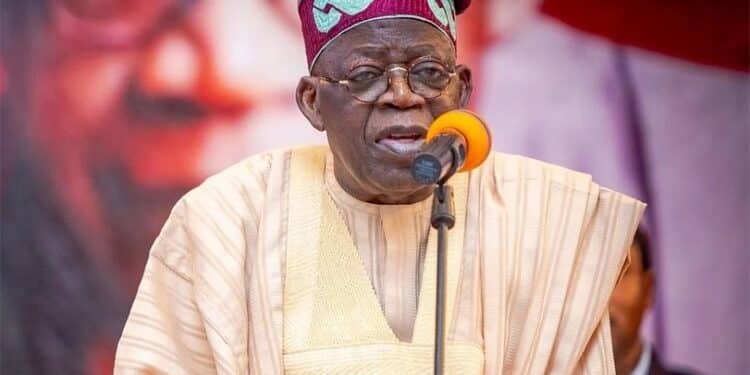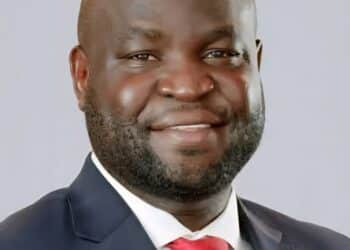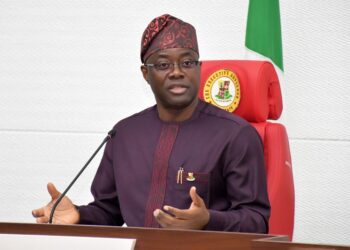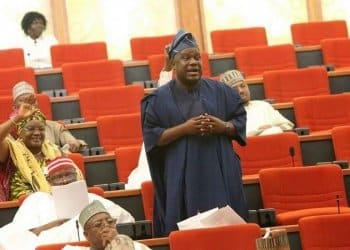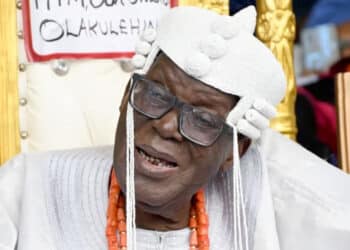The Jagaban of Borgu, Asiwaju Bola Ahmed Tinubu, I salute your agrarian doggedness and solid determination to become the President of Nigeria.
An effort that God approved, sealed and delivered to you on the 1st of March, 2023.
I congratulate you on your victory at the polls. You must not see this victory as a mere victory over vicious opponents but as one that has placed on you the enormous responsibility of effecting fundamental and surgical changes in the entire sphere of Nigeria.
Numerous pressing issues are eagerly awaiting your intervention, and I am confident that you will address them with ease, just as you did when you led Lagos State to prosperity for eight years.
Finding an alternative revenue source to oil is a fundamental issue that requires serious attention if this nation is rapidly growing, developing, and competing with other resourceful nations.
Every successive government in Nigeria in the past few years has mouthed this. Still, none has been able to effectively and earnestly make spirited efforts to search for another source of revenue just because of our overdependence on oil.
A mono-product revenue-generating nation is always at the mercy of international market indices and global events, which makes project planning and execution unstable. Thus, it stunts, truncates, or strangulates development.
This is the situation in which Nigeria has found herself today, at the mercy of global oil prices on which we, as a nation, predicated our budget and development plan.
Asiwaju, it will interest you to know that Nigeria is economically sick and developmentally ill. No serious developmental projects are being embarked upon because the oil revenue dropped drastically, which reduced the allocation alarmingly, forcing all development projects nationwide to be on hold.
The fault is not in those who derive joy in manipulating the international oil prices to suit their whims and caprices but in us as a nation, which has refused to do the needful by nurturing alternative sources of revenue.
Sir, Nigeria is an agrarian country. President Muhammad Buhari’s present government was honestly established. It embarked on rigorous re-engineering of the sector to benefit the country, and I do not doubt that you will not only build on his achievements but also add more value.
However, tourism has helped many countries overcome their mono-economy syndrome and served as an excellent revenue-generating resource.
God Almighty, besides blessing Nigeria with crude oil, also, in his infinite abundance, pampers us with multifarious natural tourism assets, which are crying for development.
This sector has helped to bail many countries out of economic doldrums, salvage them from unemployment crises, mobilise wealth, empower citizens, and make them glow and financially healthy.
Such countries include Malaysia, Indonesia, France, Kenya, South Africa, Senegal, Zimbabwe, India, Britain, Seychelles, Brazil, and Trinidad and Tobago.
Asiwaju, it will surprise you that Ghana, which has only 10 notable tourism sites, reaped a whopping $3.1 billion in international tourism receipts and investments in 2021 alone.
This is money international inbound visitors spend, including payments to national carriers for international transport. These receipts include any other pre-payment for goods or services received in the destination country.
They also may include receipts from same-day visitors, except when these are important enough to justify separate classifications. Some countries do not include receipts for passenger transport items. Data are in current U.S. dollars. Malaysia, which has a population of 27 million people, received 26.5 million visitors in 2021 with $21.05 billion.
Though still suffering from the particles of COVID-19 restrictions. I am using these two countries, which have identifiable similarities with Nigeria, to drive home my point.
Malaysia, like Nigeria, is an oil-producing country that relied heavily on oil as its primary source of revenue in the pre-1980s.
However, the oil glut in the 1980s dealt a deadly blow to Malaysia and Nigeria, almost collapsing their economies.
Realising the urgent need for alternate revenue generation sources as the oil glut receded, paving the way for an oil boom again, Malaysia, scared of being beaten twice, diverted heavy funds from oil to develop two other alternate revenue sources: manufacturing and tourism.
The country looked inward and developed most tourism sites to international standards. Malaysia, for instance, turned all the environmentally polluted and desecrated mining spots into unimaginable tourism sites and embarked on massive marketing, branding, and publicity.
Today, fluctuating global oil prices have no impact on Malaysia’s budget, which was not predicated on oil prices.
However, the reverse is the case in Nigeria. Instead of adopting Malaysia’s model and following suit, our nation swiftly forgot the trauma of the oil glut as soon as the oil boom resurfaced.
Sir, there is no tourism ingredient, element, item, object, or value, which does not abound in Nigeria.
Malaysia, which came to Nigeria 55 years ago, acquired palm seedlings and established palm tree plantations. Today, it is one of the countries that export palm oil to the world, including Nigeria.
Asiwaju, the Ghana situation is compelling and engaging. Although the country has only 10 prominent tourism sites, the government has taken the sector seriously, and it has become its major revenue source, attracting $3 billion to its economy in 2021.
Mr President-in-waiting, Jordan is another country in the Middle East, which has no oil as others but is blessed with just six major tourist sites: Petra, Wadi Rum, the Dead Sea, Amman, Jerash, and Aqab.
The government never mourned that the country was without oil, but set up the legal necessities and created a conducive atmosphere, making tourists rush to Jordan.
Sir, in 2021, Jordan reaped only $5.3 billion from tourism!
Mr President-in-waiting, the main purpose of making these few examples is to show that countries that do not have one per cent of our tourism potentialities are making money and lubricating their economy, while Nigeria, the giant of tourism, is not trying to crawl at all.
And the problem is not in our ability to recognise the potentialities of tourism, but largely because of the lucre of the cheap money from crude sales, successive governments have always been reluctant and complacent regarding the execution of tourism plans and policy.
Between Chief Obasanjo and Tourism
President-elect, sir, do you know that Chief Obasanjo inaugurated the Presidential Council on Culture and Tourism?
Sir, Chief Obasanjo, the two-time former president of Nigeria, was the first president who believed in tourism as a powerful economic booster and later worked hard to explore it as an alternative revenue source to crude oil.
It was General Obasanjo as the head of state who, at the later end of his regime in 1978, approved a sum of ₦1 million each to the 19 state governors to develop a tourism site each in their respective states.
The then General Obasanjo believed that Nigeria could kick off the tourism economy if it can sustain 19 exciting tourist sites.
Sir, only a few state governors ever used the money for that purpose.
However, one of the civilian governors who inherited the money, the late Adekunle Ajasin, the then governor of old Ondo State, expanded the state’s portion of the fund to rehabilitate and construct the Federal Government chalets at the famous Ikogosi Cold and Warm Spring.
Notably, there was never an improvement on that particular tourism site until the tenure of Governor Kayode Fayemi, who perfectly understood the economic import of tourism and transformed the once neglected site into an Eldorado.
It is instructive to point out here, sir, that Ikogosi Warm and Cold Spring Resort, which Dr Fayemi rehabilitated in Ekiti State when he was governor, is the only project, apart from the educational institutions in the state, that has continued to lubricate the state’s economy phenomenally.
Sir, it will interest you that within the first three months of its formal opening, Ikogosi Warm and Cold Spring Resort attracted over 22,000 visitors to the town and the state.
Sir, this phenomenal visit, apart from directly impacting the resort by the way of gate fee, accommodation, and feeding, also rubbed off on the economy of the state via, visitors purchasing one item or the other, ranging from petrol, drinks, pure water, drugs, food items (roadside market) and other ancillary businesses.
This is to show that if the old 19 states governors then had judiciously expended the fund allocated to tourism on a site, by now, at least, going by the Ikogosi Warm and Cold Spring Resort example, Nigeria would be proud of having 19 exciting sites.
First Ministry of Culture and Tourism
Sir, even though the first tourism seed fund was misused, Chief Obasanjo never allowed that to kill his tourism dream for the nation on his second coming as a civilian President.
Upon his swearing-in, he immediately created the first-ever Ministry of Culture and Tourism, with 11 appropriate parastatals set up with specific charters.
The parastatals are the Nigerian Tourism Development Corporation, NTDC, with charter to market, promote, nurture and develop tourism; National Institute for Hospitality and Tourism, NIHOTOUR, with the mission to serve as training ground and platform for the capacity need of the sector; National Council of Arts and Culture, NCAC, with the objective of consolidating the various cultural and arts assets of the nation in building the tourism sector; the National Institute for Cultural Orientation, NICO, with specific aim of harnessing our cultural resources to meet the challenges of social integration, peace and unity, for tourism development; National Commission for Museums and Monuments, NCMM, with the responsibility of collection, preservation and presentation of Nigerian antiquities for education and tourism purposes; Centre for Black Arts and Civilization, CBAAC, with the target of ensuring the promotion of Nigeria as the paragon of African arts, by exhibiting to the world, through lectures, symposia and exhibitions, why the millions of the diaspora population must visit Nigeria and trace their roots; National Gallery of Arts, NGA, charged with the responsibility of enhancing and developing the visual art sector for tourism; the National Troupe of Nigeria, NTN, charged with the promotion of Nigeria’s various dances; Nigerian Copyright Commission, NCC, and the National Theatre.
Mr President-in-waiting, the ministry and all the parastatals under it performed and lived up to expectations under Chief Obasanjo, not because of any miracle, but because Chief Obasanjo was then determined to ensure that the tourism sector is not only developed for its entertainment aspect or the fun of it, but to serve as an alternative source of revenue for the nation.
Hence, the ministry’s first minister, Chief Ojo Madueke, adopted the slogan: “From entertainment to emancipation.”
Every policy and project embarked upon or launched under Chief Obasanjo was tilted toward job creation, empowerment, and revenue generation to create an enabling environment. It is to the eternal contribution of Chief Obasanjo that he not only ensured a mound of financial consideration for this sector but also ensured that some of those appointed to run the affairs of the ministry and parastatals were qualified men and women.
In addition, it is on record that Chief Obasanjo did not hesitate to change or sack whoever was not pursuing the tourism vision of the nation.
Presidential Council On Tourism And Culture
Chief Obasanjo demonstrated his commitment to the tourism industry by establishing the first Presidential Council on Tourism and Culture. This council, of which he served as the chairman, included other ministers from strategic ministries such as Finance, Foreign Affairs, Internal Affairs, Police, Works, Aviation, Information, and Environment, as well as state governors from states with notable tourism sites and a desire to develop tourism in their states.
Chief Obasanjo’s inauguration of a presidential council on tourism aimed to ensure presidential attention and dispatch to tourism issues.
For instance, the Ministry of Tourism found it easy to access funds for the organisation of the first and second Abuja Carnivals and the inauguration of the Committee on Tourism Master Plan, just because these two projects had been discussed at the council, where the President was in attendance with the Minister of Finance and other ministers whose ministries were involved in the two projects.
This council met quarterly, with all members present, while issues and policies concerning tourism were made and necessary processes for implementation were set in motion and executed with presidential fiat.
While the Presidential Council on Culture and Tourism met regularly and made headway, Chief Obasanjo encouraged the states to sustain the National Council on Culture and Tourism (NCCT), where all state commissioners for Tourism and Culture in Nigeria hobnobbed and strategised on tourism.
This made the tenure of Chief Obasanjo the most memorable time for tourism, and it attracted to the nation the Conference of all Commonwealth Ministers of Tourism, when 53 ministers of the Commonwealth converged in Abuja and was addressed by the then President Obasanjo in April 2006.
Inauguration, Commencement, and Development Of The Nigeria Tourism Development Master Plan
Sir, do you believe Nigeria spent heavily on the Nigeria Tourism Development Master Plan, but unfortunately, nothing has been done about it?
The Tourism Master Plan needs a heavy revision and re-assessment, while the re-inauguration of the Abuja Carnival and the resuscitation of the Argungu Festival, the rejuvenation of various domestic tourism-cultural festivals in the six geo-political zones in Nigeria become Imperative to boost tourism and make it another source of revenue generation.
Hosting Of The Commonwealth Head of Governments, CHOGHOM
Nigeria was recognised as a tourism-friendly nation. Tinapa and Obudu Ranch Resort were conceived, and construction commenced.
The dismantling of police roadblocks or operations and the 48-hour ultimatum visa issuance policy for tourists coming to Nigeria at our embassies worldwide became state policies.
To crown Chief Obasanjo’s success in this realm, a Nigerian lady, Agbani Darego, won the Miss World beauty contest.
Chief Obasanjo laid the foundation for tourism to blossom, which was even noticed by the World Tourism Organisation (WTO), which listed Nigeria as one of the nations making progress in tourism.
Sir, you will also agree that, given the tale of tourism glory enumerated above, Nigeria should by now be one of the proud top tourism countries in the world, but that is not the case.
Jagaban, sir, that was where the beauty stopped.
Since the exit of Chief Obasanjo tourism has been ejected from the national policy.
First, the Ministry of Arts, Culture, and Tourism was subsumed under the Information Ministry.
The Presidential Council on Tourism was delisted.
The tourism budget was reduced to zero, and since then, no president has ever thought of building on the development fundamentals planted by Chief Obasanjo.
This, the hope raised in tourism, was dimmed and flushed out.
Asiwaju, I hosted a pounded yam party, when you were declared as the winner of the 2023 election, for I am sure you are our Tourism Hope Restored and Renewed.
The sector needs a Declarative National Policy on Tourism, Creative Arts, and Culture; the production of a Digitally Compliant National Tourism Master Plan; a fundamental legal framework for tourism; a separate Ministry of Tourism; a Commission for Creative Arts and Culture under the Presidency; and a Presidential Council for Tourism, Creative Arts and Culture.
These are the essentials of what the nation urgently needs to put in place for the exploration of the humongous tourism potentialities that abound in Nigeria but crying for enhancement.
Asiwaju, before I end this memo, it will interest you to know that there is a place in Nigeria where birds from all over the world hold a conference annually – Nguru – Hadeija Wetland, Yobe State.
It will interest you also to know that there is a place in Lagos State where whales glide into the air every morning – Osoroko, Ibeju Lekki.
Also, there is a rock in Ekiti State with an amphitheatre that seats 450 in Iyin Ekiti. Your Excellency may also be interested in knowing that Nigeria hosts the most beautiful masquerade in the world – Ijele – East.
Asiwaju! It is good to inform you that Iwo Eleru, the only neolithic settlement in West Africa, is in Isarun Village in Ondo State. Here, Europeans hired a helicopter to ferry the skulls and bones of stone-age creatures.
Asiwaju! We have all the tourism raw materials to shore up the revenue sources of this nation.
And lastly, our President-in-waiting, oil is exhaustible. Tourism is not.
Kindly Reawake. Rekindle. Renew. Our Tourism Hope!
Once again, congratulations!
Mo yo fun e.
Mo yo fun ara mi!
•Ojo-Lanre was Senior Special Assistant, SSA, to Dr Kayode Fayemi, the immediate past governor of Ekiti State on Tourism Development; member, Special Media Projects, New Media, All Progressives Congress, APC, Presidential Campaign Council, PCC; Country Leader, Federation of World Arts and Culture Society, Singapore; Goodwill Tourism Ambassador for Cote ‘d’Ivoire in Nigeria; and National Tourism Award Recipient.

